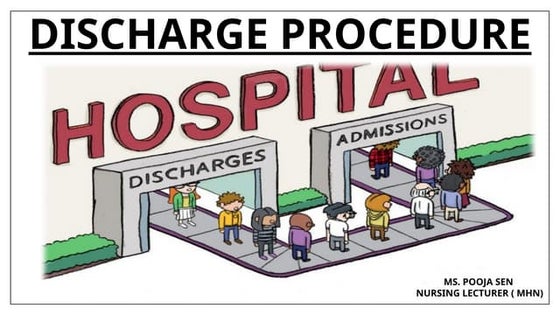Global childcare in france (1)
Download as PPT, PDF1 like301 views
France has a universal childcare system that provides care options from infancy through preschool. Children can attend communal nurseries called Creches starting at age 2.5, or be cared for by an Assistante Maternelle (nanny) in their home. Preschool education has existed in France since the 18th century and enrollment became nearly universal for ages 3-6 by the 1990s. All preschool programs follow a national curriculum focused on developing language, physical expression, social skills, learning about the world, and creativity. Early childhood educators are required to have a high school diploma plus a 27-month training program in child development and care.
1 of 20
Download to read offline




















Recommended
French vs U.S. school systems



French vs U.S. school systemsth1153268mhs
╠²
This document compares school systems in the U.S. and France. It notes that in France, preschool starts earlier at ages 2-3 compared to 4-5 in the U.S. School years are labeled in descending order in France from 12-1, versus ascending order from 1-12 in the U.S. Students in both countries attend school Monday through Friday, although in France students have Wednesday off.Education in France



Education in Franceviimsikool
╠²
France has an education system that consists of kindergarten, elementary school, high school, and university. It begins with pre-school from ages 2-5, then primary school from ages 6-11, followed by secondary school ("coll├©ge") from ages 12-15 which is mandatory. After age 16, students can leave school, attend vocational school, or a general or technical high school to prepare for the baccalaureate exam at age 18, which is required to attend university. The university system was reorganized in 2002 to be compatible with European standards.ERASMUS



ERASMUSsongul_unluol
╠²
The document discusses the Erasmus program, which allows students to spend one or two semesters studying in another European country. It provides opportunities for education, learning new cultures, having fun, making new friendships, and learning new languages. The university has agreements with 23 countries and 86 other European universities. The Erasmus program helps students learn about other cultures and find international relationships, with some students even finding love during their time abroad.Raven condo v2



Raven condo v2keasonwest
╠²
This 1 bedroom condo located at 3434 E. Baseline Road, Unit 205 in Phoenix, Arizona is for rent. The condo is conveniently located near South Mountain and is close to schools, shopping, and services. It features a secure gated community, reserved covered parking, five appliances, a spacious floor plan, generous closet and storage space, and new laminate flooring. For more information, contact xxx-xxx-xxxx.Health templates (infant and toddler years)



Health templates (infant and toddler years)Rene Chen
╠²
The document discusses several health and safety considerations for infants and toddlers. It notes that proper hand washing is essential to prevent infections in infants. It also mentions sudden infant death syndrome (SIDS) as a risk, especially for premature or low birth weight babies, and recommends safe sleep practices. Additionally, it discusses allergies, safety in cars through approved car seats, benefits of breastfeeding, importance of immunizations, and more. For toddlers, it brings up drowning risks, preventing diarrhea infections, ensuring balanced nutrition to prevent malnutrition, medication safety, and checking outdoor equipment for safety.Isup t-rec-q 931-199805-i!!pdf-e



Isup t-rec-q 931-199805-i!!pdf-eSidhartha Muraleedharan
╠²
This document specifies procedures for establishing, maintaining, and clearing network connections at the ISDN user-network interface. It defines messages exchanged over the D-channel of basic and primary rate interfaces. The messages control circuit-switched calls, packet-mode access connections, and temporary signaling connections. Call states are defined for the user and network sides of the interface, as well as for the global call reference. Message formats and coding of information elements are also specified.Advocacy



AdvocacyRene Chen
╠²
This document discusses extending support for youth transitioning from foster care. It notes that 42% of young adults aged 20-29 live at home with parents, but youth leaving foster care at age 18 have no one for support. Extending care would save the province money according to a report. The document advocates extending financial and other tangible support through age 21 and engaging stakeholders like foster youth groups to advocate for this change through hearings and involvement opportunities for people.Global cellular market trends 



Global cellular market trends Sidhartha Muraleedharan
╠²
Global cellular connections reached 6.54 billion in Q4 2012, with 3G/4G technologies accounting for over 25% of connections. There were 50 new network launches during the quarter, including LTE Advanced in Russia. Rapid increases in mobile data usage are helping drive economic growth. The Americas saw 11.9 million net additions in Q3 2012, with Am├®rica M├│vil continuing to lead growth, while LTE networks began launching in key markets like Mexico and Brazil.Real final ppt



Real final pptamybao
╠²
The document compares the early childhood education systems in France and Ontario, Canada. In France, public childcare developed after World War 2 and free preschool was established in 1971. Children ages 2-5 can attend nursery school. Nursery school teachers are required to have a university degree. The philosophy is to prepare children for roles in French society. In Ontario, licensed childcare is available for infants through school-age. Kindergarten is available for ages 3-5. Early childhood educators require at least one year of post-secondary education. The goal is to support children's learning and development in a community environment.Real final ppt



Real final pptamybao
╠²
The document compares the early childhood education systems in France and Ontario, Canada. In France, nursery schools were established in the 1800s and expanded after World War 2. Children ages 2-5 typically attend ├®cole maternelle preschools for part or full days. Teachers require a university degree. Preschools focus on language, social skills, creative expression, and learning about the world. Childcare is also provided through family day cares and nursery assistants. In Ontario, licensed childcare includes center-based care and home daycares. Teachers complete university-based training. The philosophies focus on welcoming children and preparing them to learn.Real final ppt



Real final pptspan9
╠²
The document compares the early childhood education systems in France and Ontario, Canada. In France, nursery schools were recognized in the late 1800s and public childcare expanded after World War 2. Children ages 2-5 typically attend ├®cole maternelle preschools. Teachers require a university degree and training. Programs focus on language, social skills, creativity, and learning about the world. In Ontario, licensed childcare includes home-based and center-based options. Teachers require college education and training. Programs aim to support children's development and prepare them for school. Both systems have evolved over time to improve availability, accessibility, and quality of early education.Real final ppt



Real final pptamybao
╠²
The document compares the early childhood education systems in France and Ontario, Canada. In France, nursery schools were recognized in the late 1800s and public childcare expanded after World War 2. Children ages 2-5 typically attend ├®cole maternelle preschools. Teachers require a university degree and training. Programs focus on language, social skills, creativity, and learning about the world. In Ontario, licensed childcare includes home-based and center-based options. Teachers complete college programs. Programs aim to support children's development and prepare them for school. Both systems have evolved over time to improve availability, accessibility, and quality of early education.Ppt



Pptannyliang123
╠²
This document compares child care systems in France and Ontario. In France, the first day cares appeared around 1840 and the government began subsidizing child care in the 1860s. There are three main types of child care - parental cr├©ches run by associations, company cr├©ches, and family cr├©ches run by nannies. In Ontario, various philosophies guide child care curriculums and the government licenses and subsidizes centers. Both places face challenges with availability of spaces, though demand often exceeds supply.Reflection sheet with pics



Reflection sheet with picskhuloodagha
╠²
France has a long history of early childhood education dating back to 1771 with the establishment of knitting schools. In the 19th century, the government established free full-day childcare for children aged 2-6 and charitable cr├©ches. Currently, France merges preschool and elementary education for ages 2-11 into three-year cycles. The French system emphasizes school readiness, language, and culture. Preschool is optional until age 5 and includes meals, skills development, and arts/games. Nearly all 3-6 year olds attend nursery school. Staff are mostly female and hold childcare diplomas, with ratios of 1:5 for infants and 1:8 for toddlers. Both Canada and France value earlyInternationalschoolsguidein paris



Internationalschoolsguidein parissensussoft
╠²
The document provides information on several international and bilingual schools in Paris and the Ile-de-France region of France. It discusses schools that offer early education programs, schools for families who have recently relocated, and schools that provide education from preschool through high school. It also mentions schools that bring together students from different backgrounds to create a melting pot environment. For each school, it provides a brief overview of the grade levels, focus, and key highlights. The overall document serves as a guide for choosing the best international or bilingual school for children in the Paris area.Presentation 20%11



Presentation 20%11maywong1015
╠²
This document provides an overview of the global childcare system in France. It discusses the history and evolution of childcare services in France since the 1920s. It also compares key aspects of the French system such as the underlying philosophy, types of childcare settings, teacher training requirements, the roles of early childhood educators, availability and accessibility of services, typical program structures, and ratios to the childcare system in Ontario, Canada. The document aims to provide a deeper understanding of the differences between the French and Canadian childcare systems.Presentation 20%11



Presentation 20%11maywong1015
╠²
This document provides an overview of the global childcare system in France. It begins with an introduction and agenda, then discusses the history and evolution of childcare services in France. Key aspects of the French system are explored, including the underlying philosophy, types of childcare settings, teacher training requirements, the roles of early childhood educators, availability and accessibility of services, typical program structures, and comparisons with Ontario, Canada. The document aims to provide a deeper understanding of the differences between French and Canadian approaches to early childhood education and care.International Schools in Barcelona



International Schools in BarcelonaBarcelona Activa
╠²
Practical guide for newcomers with children. Education is a key tool for economic development and competitiveness, and plays an essential role in social cohesion and the integration of residents from around the world.CV



CVMorgane daurel
╠²
Morgane Daurel has extensive experience teaching French to children ages 1-15 through her work with Club Petit Pierrot. She is currently a teacher with them and is in charge of an after school club. She has also taught English in secondary schools during internships. Daurel has a bachelor's degree in English and American literature and is qualified to work in summer camps. She has experience in childcare, secretarial work, and as an au pair in England and Ireland. Daurel is motivated to further her teaching skills and wants to complete a PGCE to become a certified teacher.Little europeans know each other (1)



Little europeans know each other (1)wiosenka
╠²
The document summarizes the activities from the first transnational meeting of the Erasmus+ project that was held in Elazig, Turkey on October 10-11. At the meeting, the partners established a baseline, revised the workplan, scheduled future meetings, and assigned tasks. They also presented information about their countries, cities, and schools. Turkey prepared the project brochure. Poland designed the website. And Italy designed the logo for the project.Education system in france



Education system in franceFernando Alcoforado
╠²
France offers public and private schools at all levels. Educational standards are generally high. The rigorous curriculum is dictated by the Ministry of Education and is practically the same across the country and in the French territories. Teachers are considered public workers and the teachers' unions are very powerful officials. Teacher strikes are frequent and often they are cited as the main reason for French families opt for private schools, which are overwhelmingly Catholic. The education system in France emphasizes the teacher's authority, the individual competition, including an absolute rating system, with stress on analytical thinking and rote learning as opposed to creativity. Child care from a global perspective



Child care from a global perspectiveSameer1786
╠²
The document discusses child care in Germany from the perspectives of several group members. It covers the types of childcare available, which includes kindergartens for ages 3-6 and before/after school programs. The history of childcare in Germany is explored, noting it began in the 19th century to care for working class children and educate wealthy children. The philosophy emphasizes educating and caring for children until age 3, whereas Ontario focuses on ages 0-12. Training requirements for childcare workers include certification as a special education teacher or a high school diploma.Global Childcare in France



Global Childcare in Franceprincessfrancisco
╠²
France has a comprehensive early childhood education system that is largely publicly funded. Preschool programs called Ecoles Maternelles serve almost all children ages 3 to 6 and are free. These preschools are integrated with elementary schools and do not charge fees. For infants and toddlers, France has subsidized daycare centers and licensed family daycare homes. The system aims to provide accessible, affordable childcare and early education for all families.France Power Point



France Power Pointbrittanypachouris
╠²
France has a comprehensive early childhood education system that is largely publicly funded. Preschool programs called Ecoles Maternelles serve almost all children ages 3 to 6 and are free, integrated into primary schools. These preschools have three levels and do not charge fees. Training for early childhood educators includes obtaining a university degree and teacher-based training through teacher institutes. Availability of childcare is widespread across France but demand often exceeds supply, so parents are advised to get on waiting lists early.Vers─āo final



Vers─āo finalwiosenka
╠²
In the 1980s, Portugal began developing its preschool education system with new laws and facilities established by the Ministry of Education. Preschool was recognized in the 1990s as the first step of school, though attendance is still not compulsory. Coverage of preschool education has increased from 29.3% in 1985 to 78.4% in 2005. The Ministry of Education's goal is 80% coverage. Preschool includes an educational component and family support component, with the educational portion free and family support paid based on municipal criteria.National school system of france



National school system of franceserkaning
╠²
The document outlines the French school system, beginning with an overview of the founding principles of free, secular, and compulsory public education. It then describes the different levels and cycles of education from nursery school through high school/university, including typical course contents and objectives at each level. Key aspects of the primary education system such as the organization of the school day and teaching time allotted to different subjects are also summarized.Education System of United kingdom



Education System of United kingdomI dont Work , Im a boss. (H)
╠²
The United Kingdom is made up of England, Wales, Scotland, and Northern Ireland. Education is compulsory between the ages of 5-16 and follows a structure of early years education, primary school, secondary school, further education, and higher education. Primary education is provided in primary schools from ages 5-11, after which most students transfer to comprehensive secondary schools, which educate students from ages 11-18/19 and provide both academic and practical learning.StudentLife.ppt



StudentLife.pptPariShah22
╠²
France has a national education system that provides free compulsory education from ages 6 to 16, with the majority of children attending public primary and secondary schools. The education system places an emphasis on subjects like French, math, and history, as well as developing good communication skills at a young age. After secondary school, students can pursue higher education or vocational training, with the best students attending elite graduate schools to prepare for careers in government, education, and other fields.Dot NET Core Interview Questions PDF By ScholarHat



Dot NET Core Interview Questions PDF By ScholarHatScholarhat
╠²
Dot NET Core Interview Questions PDF By ScholarHatNUTRITIONAL ASSESSMENT AND EDUCATION - 5TH SEM.pdf



NUTRITIONAL ASSESSMENT AND EDUCATION - 5TH SEM.pdfDolisha Warbi
╠²
NUTRITIONAL ASSESSMENT AND EDUCATION, Introduction, definition, types - macronutrient and micronutrient, food pyramid, meal planning, nutritional assessment of individual, family and community by using appropriate method, nutrition education, nutritional rehabilitation, nutritional deficiency disorder, law/policies regarding nutrition in India, food hygiene, food fortification, food handling and storage, food preservation, food preparation, food purchase, food consumption, food borne diseases, food poisoningMore Related Content
Similar to Global childcare in france (1) (20)
Real final ppt



Real final pptamybao
╠²
The document compares the early childhood education systems in France and Ontario, Canada. In France, public childcare developed after World War 2 and free preschool was established in 1971. Children ages 2-5 can attend nursery school. Nursery school teachers are required to have a university degree. The philosophy is to prepare children for roles in French society. In Ontario, licensed childcare is available for infants through school-age. Kindergarten is available for ages 3-5. Early childhood educators require at least one year of post-secondary education. The goal is to support children's learning and development in a community environment.Real final ppt



Real final pptamybao
╠²
The document compares the early childhood education systems in France and Ontario, Canada. In France, nursery schools were established in the 1800s and expanded after World War 2. Children ages 2-5 typically attend ├®cole maternelle preschools for part or full days. Teachers require a university degree. Preschools focus on language, social skills, creative expression, and learning about the world. Childcare is also provided through family day cares and nursery assistants. In Ontario, licensed childcare includes center-based care and home daycares. Teachers complete university-based training. The philosophies focus on welcoming children and preparing them to learn.Real final ppt



Real final pptspan9
╠²
The document compares the early childhood education systems in France and Ontario, Canada. In France, nursery schools were recognized in the late 1800s and public childcare expanded after World War 2. Children ages 2-5 typically attend ├®cole maternelle preschools. Teachers require a university degree and training. Programs focus on language, social skills, creativity, and learning about the world. In Ontario, licensed childcare includes home-based and center-based options. Teachers require college education and training. Programs aim to support children's development and prepare them for school. Both systems have evolved over time to improve availability, accessibility, and quality of early education.Real final ppt



Real final pptamybao
╠²
The document compares the early childhood education systems in France and Ontario, Canada. In France, nursery schools were recognized in the late 1800s and public childcare expanded after World War 2. Children ages 2-5 typically attend ├®cole maternelle preschools. Teachers require a university degree and training. Programs focus on language, social skills, creativity, and learning about the world. In Ontario, licensed childcare includes home-based and center-based options. Teachers complete college programs. Programs aim to support children's development and prepare them for school. Both systems have evolved over time to improve availability, accessibility, and quality of early education.Ppt



Pptannyliang123
╠²
This document compares child care systems in France and Ontario. In France, the first day cares appeared around 1840 and the government began subsidizing child care in the 1860s. There are three main types of child care - parental cr├©ches run by associations, company cr├©ches, and family cr├©ches run by nannies. In Ontario, various philosophies guide child care curriculums and the government licenses and subsidizes centers. Both places face challenges with availability of spaces, though demand often exceeds supply.Reflection sheet with pics



Reflection sheet with picskhuloodagha
╠²
France has a long history of early childhood education dating back to 1771 with the establishment of knitting schools. In the 19th century, the government established free full-day childcare for children aged 2-6 and charitable cr├©ches. Currently, France merges preschool and elementary education for ages 2-11 into three-year cycles. The French system emphasizes school readiness, language, and culture. Preschool is optional until age 5 and includes meals, skills development, and arts/games. Nearly all 3-6 year olds attend nursery school. Staff are mostly female and hold childcare diplomas, with ratios of 1:5 for infants and 1:8 for toddlers. Both Canada and France value earlyInternationalschoolsguidein paris



Internationalschoolsguidein parissensussoft
╠²
The document provides information on several international and bilingual schools in Paris and the Ile-de-France region of France. It discusses schools that offer early education programs, schools for families who have recently relocated, and schools that provide education from preschool through high school. It also mentions schools that bring together students from different backgrounds to create a melting pot environment. For each school, it provides a brief overview of the grade levels, focus, and key highlights. The overall document serves as a guide for choosing the best international or bilingual school for children in the Paris area.Presentation 20%11



Presentation 20%11maywong1015
╠²
This document provides an overview of the global childcare system in France. It discusses the history and evolution of childcare services in France since the 1920s. It also compares key aspects of the French system such as the underlying philosophy, types of childcare settings, teacher training requirements, the roles of early childhood educators, availability and accessibility of services, typical program structures, and ratios to the childcare system in Ontario, Canada. The document aims to provide a deeper understanding of the differences between the French and Canadian childcare systems.Presentation 20%11



Presentation 20%11maywong1015
╠²
This document provides an overview of the global childcare system in France. It begins with an introduction and agenda, then discusses the history and evolution of childcare services in France. Key aspects of the French system are explored, including the underlying philosophy, types of childcare settings, teacher training requirements, the roles of early childhood educators, availability and accessibility of services, typical program structures, and comparisons with Ontario, Canada. The document aims to provide a deeper understanding of the differences between French and Canadian approaches to early childhood education and care.International Schools in Barcelona



International Schools in BarcelonaBarcelona Activa
╠²
Practical guide for newcomers with children. Education is a key tool for economic development and competitiveness, and plays an essential role in social cohesion and the integration of residents from around the world.CV



CVMorgane daurel
╠²
Morgane Daurel has extensive experience teaching French to children ages 1-15 through her work with Club Petit Pierrot. She is currently a teacher with them and is in charge of an after school club. She has also taught English in secondary schools during internships. Daurel has a bachelor's degree in English and American literature and is qualified to work in summer camps. She has experience in childcare, secretarial work, and as an au pair in England and Ireland. Daurel is motivated to further her teaching skills and wants to complete a PGCE to become a certified teacher.Little europeans know each other (1)



Little europeans know each other (1)wiosenka
╠²
The document summarizes the activities from the first transnational meeting of the Erasmus+ project that was held in Elazig, Turkey on October 10-11. At the meeting, the partners established a baseline, revised the workplan, scheduled future meetings, and assigned tasks. They also presented information about their countries, cities, and schools. Turkey prepared the project brochure. Poland designed the website. And Italy designed the logo for the project.Education system in france



Education system in franceFernando Alcoforado
╠²
France offers public and private schools at all levels. Educational standards are generally high. The rigorous curriculum is dictated by the Ministry of Education and is practically the same across the country and in the French territories. Teachers are considered public workers and the teachers' unions are very powerful officials. Teacher strikes are frequent and often they are cited as the main reason for French families opt for private schools, which are overwhelmingly Catholic. The education system in France emphasizes the teacher's authority, the individual competition, including an absolute rating system, with stress on analytical thinking and rote learning as opposed to creativity. Child care from a global perspective



Child care from a global perspectiveSameer1786
╠²
The document discusses child care in Germany from the perspectives of several group members. It covers the types of childcare available, which includes kindergartens for ages 3-6 and before/after school programs. The history of childcare in Germany is explored, noting it began in the 19th century to care for working class children and educate wealthy children. The philosophy emphasizes educating and caring for children until age 3, whereas Ontario focuses on ages 0-12. Training requirements for childcare workers include certification as a special education teacher or a high school diploma.Global Childcare in France



Global Childcare in Franceprincessfrancisco
╠²
France has a comprehensive early childhood education system that is largely publicly funded. Preschool programs called Ecoles Maternelles serve almost all children ages 3 to 6 and are free. These preschools are integrated with elementary schools and do not charge fees. For infants and toddlers, France has subsidized daycare centers and licensed family daycare homes. The system aims to provide accessible, affordable childcare and early education for all families.France Power Point



France Power Pointbrittanypachouris
╠²
France has a comprehensive early childhood education system that is largely publicly funded. Preschool programs called Ecoles Maternelles serve almost all children ages 3 to 6 and are free, integrated into primary schools. These preschools have three levels and do not charge fees. Training for early childhood educators includes obtaining a university degree and teacher-based training through teacher institutes. Availability of childcare is widespread across France but demand often exceeds supply, so parents are advised to get on waiting lists early.Vers─āo final



Vers─āo finalwiosenka
╠²
In the 1980s, Portugal began developing its preschool education system with new laws and facilities established by the Ministry of Education. Preschool was recognized in the 1990s as the first step of school, though attendance is still not compulsory. Coverage of preschool education has increased from 29.3% in 1985 to 78.4% in 2005. The Ministry of Education's goal is 80% coverage. Preschool includes an educational component and family support component, with the educational portion free and family support paid based on municipal criteria.National school system of france



National school system of franceserkaning
╠²
The document outlines the French school system, beginning with an overview of the founding principles of free, secular, and compulsory public education. It then describes the different levels and cycles of education from nursery school through high school/university, including typical course contents and objectives at each level. Key aspects of the primary education system such as the organization of the school day and teaching time allotted to different subjects are also summarized.Education System of United kingdom



Education System of United kingdomI dont Work , Im a boss. (H)
╠²
The United Kingdom is made up of England, Wales, Scotland, and Northern Ireland. Education is compulsory between the ages of 5-16 and follows a structure of early years education, primary school, secondary school, further education, and higher education. Primary education is provided in primary schools from ages 5-11, after which most students transfer to comprehensive secondary schools, which educate students from ages 11-18/19 and provide both academic and practical learning.StudentLife.ppt



StudentLife.pptPariShah22
╠²
France has a national education system that provides free compulsory education from ages 6 to 16, with the majority of children attending public primary and secondary schools. The education system places an emphasis on subjects like French, math, and history, as well as developing good communication skills at a young age. After secondary school, students can pursue higher education or vocational training, with the best students attending elite graduate schools to prepare for careers in government, education, and other fields.Recently uploaded (20)
Dot NET Core Interview Questions PDF By ScholarHat



Dot NET Core Interview Questions PDF By ScholarHatScholarhat
╠²
Dot NET Core Interview Questions PDF By ScholarHatNUTRITIONAL ASSESSMENT AND EDUCATION - 5TH SEM.pdf



NUTRITIONAL ASSESSMENT AND EDUCATION - 5TH SEM.pdfDolisha Warbi
╠²
NUTRITIONAL ASSESSMENT AND EDUCATION, Introduction, definition, types - macronutrient and micronutrient, food pyramid, meal planning, nutritional assessment of individual, family and community by using appropriate method, nutrition education, nutritional rehabilitation, nutritional deficiency disorder, law/policies regarding nutrition in India, food hygiene, food fortification, food handling and storage, food preservation, food preparation, food purchase, food consumption, food borne diseases, food poisoningOdoo 18 Accounting Access Rights - Odoo 18 ║▌║▌▀Żs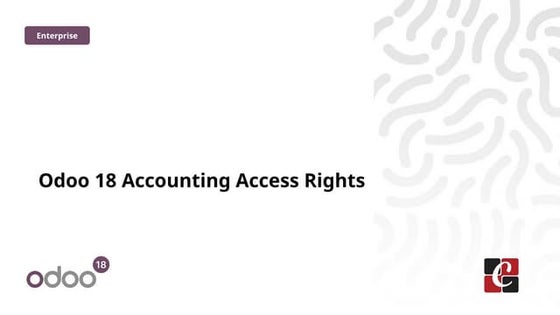



Odoo 18 Accounting Access Rights - Odoo 18 ║▌║▌▀ŻsCeline George
╠²
In this slide, weŌĆÖll discuss on accounting access rights in odoo 18. To ensure data security and maintain confidentiality, Odoo provides a robust access rights system that allows administrators to control who can access and modify accounting data. Comprehensive Guide to Antibiotics & Beta-Lactam Antibiotics.pptx



Comprehensive Guide to Antibiotics & Beta-Lactam Antibiotics.pptxSamruddhi Khonde
╠²
¤ōó Comprehensive Guide to Antibiotics & Beta-Lactam Antibiotics
¤ö¼ Antibiotics have revolutionized medicine, playing a crucial role in combating bacterial infections. Among them, Beta-Lactam antibiotics remain the most widely used class due to their effectiveness against Gram-positive and Gram-negative bacteria. This guide provides a detailed overview of their history, classification, chemical structures, mode of action, resistance mechanisms, SAR, and clinical applications.
¤ōī What YouŌĆÖll Learn in This Presentation
Ō£ģ History & Evolution of Antibiotics
Ō£ģ Cell Wall Structure of Gram-Positive & Gram-Negative Bacteria
Ō£ģ Beta-Lactam Antibiotics: Classification & Subtypes
Ō£ģ Penicillins, Cephalosporins, Carbapenems & Monobactams
Ō£ģ Mode of Action (MOA) & Structure-Activity Relationship (SAR)
Ō£ģ Beta-Lactamase Inhibitors & Resistance Mechanisms
Ō£ģ Clinical Applications & Challenges.
¤ÜĆ Why You Should Check This Out?
Essential for pharmacy, medical & life sciences students.
Provides insights into antibiotic resistance & pharmaceutical trends.
Useful for healthcare professionals & researchers in drug discovery.
¤æē Swipe through & explore the world of antibiotics today!
¤öö Like, Share & Follow for more in-depth pharma insights!Interim Guidelines for PMES-DM-17-2025-PPT.pptx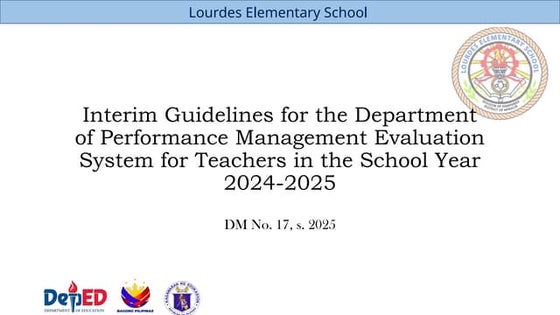



Interim Guidelines for PMES-DM-17-2025-PPT.pptxsirjeromemanansala
╠²
This is the latest issuance on PMES as replacement of RPMS. Kindly message me to gain full access of the presentation. Functional Muscle Testing of Facial Muscles.pdf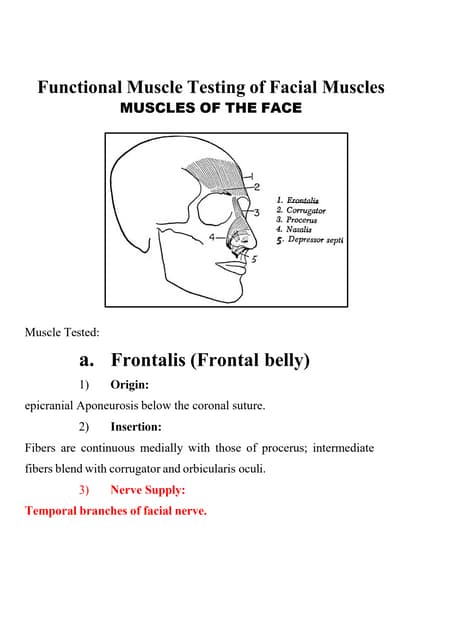



Functional Muscle Testing of Facial Muscles.pdfSamarHosni3
╠²
Functional Muscle Testing of Facial Muscles.pdfUnit 1 Computer Hardware for Educational Computing.pptx



Unit 1 Computer Hardware for Educational Computing.pptxRomaSmart1
╠²
Computers have revolutionized various sectors, including education, by enhancing learning experiences and making information more accessible. This presentation, "Computer Hardware for Educational Computing," introduces the fundamental aspects of computers, including their definition, characteristics, classification, and significance in the educational domain. Understanding these concepts helps educators and students leverage technology for more effective learning.Azure Administrator Interview Questions By ScholarHat



Azure Administrator Interview Questions By ScholarHatScholarhat
╠²
Azure Administrator Interview Questions By ScholarHatASP.NET Interview Questions PDF By ScholarHat



ASP.NET Interview Questions PDF By ScholarHatScholarhat
╠²
ASP.NET Interview Questions PDF By ScholarHatASP.NET Web API Interview Questions By Scholarhat



ASP.NET Web API Interview Questions By ScholarhatScholarhat
╠²
ASP.NET Web API Interview Questions By ScholarhatChapter 2. Strategic Management: Corporate Governance.pdf



Chapter 2. Strategic Management: Corporate Governance.pdfRommel Regala
╠²
This course provides students with a comprehensive understanding of strategic management principles, frameworks, and applications in business. It explores strategic planning, environmental analysis, corporate governance, business ethics, and sustainability. The course integrates Sustainable Development Goals (SDGs) to enhance global and ethical perspectives in decision-making.How to Configure Recurring Revenue in Odoo 17 CRM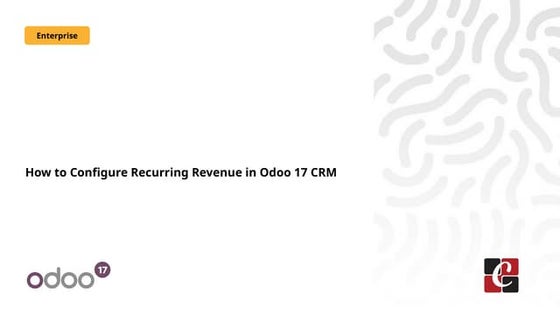



How to Configure Recurring Revenue in Odoo 17 CRMCeline George
╠²
This slide will represent how to configure Recurring revenue. Recurring revenue are the income generated at a particular interval. Typically, the interval can be monthly, yearly, or we can customize the intervals for a product or service based on its subscription or contract. Entity Framework Interview Questions PDF By ScholarHat



Entity Framework Interview Questions PDF By ScholarHatScholarhat
╠²
Entity Framework Interview Questions PDF By ScholarHatGlobal childcare in france (1)
- 1. By: Maria Cedeno Rene Chen Jordan Deangkinay April-Gayle de Guzman
- 2. ╠²
- 3. France, officially named the French Republic is located in Western Europe. Since the breaking of the Soviet Union, France is currently the second largest country in Europe. Overview of France
- 4. The capital of France is Paris, which the famous Eiffel Tower is located.
- 5. Blue Blue represent the countryŌĆÖs truth and loyalty. Red represents bravery and strength. Red White White represent the honesty and peace of the country. FranceŌĆÖs Flag
- 6. Paris has played an important role as the centre of high culture and fashion. France is also a great country to do business with and a lovely travel destination.
- 7. FranceŌĆÖs childcare system is close to universal. From the age of two and a half to three, a child can be place in either a Cr├©che (Communal Nursery) or a home of an Assistante Maternelle (Nanny). Type of Childcare System
- 8. Depending on the ages of the children, an Assistante Maternelle can have from one to five children.
- 9. Closed for one month over the summer period and public holidays. Most Cr├©ches are open 11 hours a day. Quality childcare costs about 300 to 400 dollars a month.
- 10. Neither Cr├©che or Assstante Maternelle are compulsory as schooling. In France, it is not obligatory until a child reaches the age of 5-6 years old.
- 11. Preschool education has a long tradition in France. As early as 1771, ŌĆ£knitting schoolsŌĆØ (├®coles ├Ā tricoter) existed in parts of France for four to seven year olds. In the 1830s, an official program and regulations were established for free (8hr-19hr) services for children two to six years old. History of Childcare
- 12. During the 20 th century, more advantaged families began to enroll their young children in jardin dŌĆÖenfants and classes in lyc├®es bourgeois. Enrolment rapidly increased in the 1960s and 1970s and because a close to universal for the three to six year olds by the beginning of the 1990s.
- 13. All preschools in France follow the same national curriculum, it structures childrenŌĆÖs learning around five domains of activities. Underlying Philosophy
- 14. Developing Oral Language and in Introduction to Writing. Acting and expressing emotions and thoughts with oneŌĆÖs body.
- 15. Learning how to work together. Discovering the world. Imagining, feeling and creating.
- 16. Parents can send their children to nurseries as soon as the baby is 3 months old. All centres meet strict learning policies. Availability & Accessibility
- 17. Staff members must have a diploma. Enrolling your child into a nursery or preschool in France is quite a challenging part. When having a child, they should enroll them to ensure a couple knows they will be a spot in the nursery or preschool.
- 18. French nurseries accept children from two to six years of age. These nurseries do not charge anything, they are free. These are run similar to a school system.
- 19. Training of the Childcare Workers Early childhood Education was created in 1973 Early Childhood Educators must have completed a High school Education and a 27 month course of both theory and practical field experience An ECE in France is only qualified to work with children from birth till age seven Although if you would like to work directly to with the Preschool age group you would have to complete and 3 year degree program in University and then write a exam in order to become licensed .
- 20. The End, Thank you!


